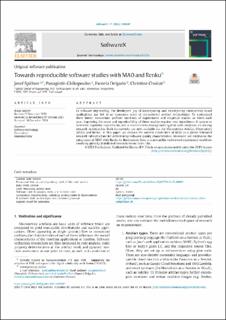Please use this identifier to cite or link to this item:
https://doi.org/10.21256/zhaw-23956Full metadata record
| DC Field | Value | Language |
|---|---|---|
| dc.contributor.author | Spillner, Josef | - |
| dc.contributor.author | Gkikopoulos, Panagiotis | - |
| dc.contributor.author | Delgado, Pamela | - |
| dc.contributor.author | Choirat, Christine | - |
| dc.date.accessioned | 2022-01-20T10:36:38Z | - |
| dc.date.available | 2022-01-20T10:36:38Z | - |
| dc.date.issued | 2022 | - |
| dc.identifier.issn | 2352-7110 | de_CH |
| dc.identifier.uri | https://digitalcollection.zhaw.ch/handle/11475/23956 | - |
| dc.description.abstract | In software engineering, the developers’ joy of decomposing and recomposing microservice-based applications has led to an enormous wave of microservice artefact technologies. To understand them better, researchers perform hundreds of experiments and empirical studies on them each year. Improving the reuse and reproducibility of these studies requires two ingredients: A system to automate repetitive experiments, and a research data management system with emphasis on making research reproducible. Both frameworks are now available via the Microservice Artefact Observatory (MAO) and Renku. In this paper, we explain the current capabilities of MAO as a global federated research infrastructure for determining software quality characteristics. Moreover, we emphasise the integration of MAO with Renku to demonstrate how a reproducible end-to-end experiment workflow involving globally distributed research teams looks like. | de_CH |
| dc.language.iso | en | de_CH |
| dc.publisher | Elsevier | de_CH |
| dc.relation.ispartof | SoftwareX | de_CH |
| dc.rights | http://creativecommons.org/licenses/by/4.0/ | de_CH |
| dc.subject | Software technology | de_CH |
| dc.subject | Data science | de_CH |
| dc.subject | Reproducibility | de_CH |
| dc.subject.ddc | 005: Computerprogrammierung, Programme und Daten | de_CH |
| dc.title | Towards reproducible software studies with MAO and Renku | de_CH |
| dc.type | Beitrag in wissenschaftlicher Zeitschrift | de_CH |
| dcterms.type | Text | de_CH |
| zhaw.departement | School of Engineering | de_CH |
| zhaw.organisationalunit | Institut für Informatik (InIT) | de_CH |
| dc.identifier.doi | 10.1016/j.softx.2021.100947 | de_CH |
| dc.identifier.doi | 10.21256/zhaw-23956 | - |
| zhaw.funding.eu | Not specified | de_CH |
| zhaw.issue | 100947 | de_CH |
| zhaw.originated.zhaw | Yes | de_CH |
| zhaw.publication.status | publishedVersion | de_CH |
| zhaw.volume | 17 | de_CH |
| zhaw.publication.review | Peer review (Publikation) | de_CH |
| zhaw.webfeed | Service Engineering | de_CH |
| zhaw.author.additional | No | de_CH |
| zhaw.display.portrait | Yes | de_CH |
| Appears in collections: | Publikationen School of Engineering | |
Files in This Item:
| File | Description | Size | Format | |
|---|---|---|---|---|
| 2022_Spillner-Gkikopoulus_MAO-Renku_SoftwareX.pdf | 3.71 MB | Adobe PDF |  View/Open |
Show simple item record
Spillner, J., Gkikopoulos, P., Delgado, P., & Choirat, C. (2022). Towards reproducible software studies with MAO and Renku. SoftwareX, 17(100947). https://doi.org/10.1016/j.softx.2021.100947
Spillner, J. et al. (2022) ‘Towards reproducible software studies with MAO and Renku’, SoftwareX, 17(100947). Available at: https://doi.org/10.1016/j.softx.2021.100947.
J. Spillner, P. Gkikopoulos, P. Delgado, and C. Choirat, “Towards reproducible software studies with MAO and Renku,” SoftwareX, vol. 17, no. 100947, 2022, doi: 10.1016/j.softx.2021.100947.
SPILLNER, Josef, Panagiotis GKIKOPOULOS, Pamela DELGADO und Christine CHOIRAT, 2022. Towards reproducible software studies with MAO and Renku. SoftwareX. 2022. Bd. 17, Nr. 100947. DOI 10.1016/j.softx.2021.100947
Spillner, Josef, Panagiotis Gkikopoulos, Pamela Delgado, and Christine Choirat. 2022. “Towards Reproducible Software Studies with MAO and Renku.” SoftwareX 17 (100947). https://doi.org/10.1016/j.softx.2021.100947.
Spillner, Josef, et al. “Towards Reproducible Software Studies with MAO and Renku.” SoftwareX, vol. 17, no. 100947, 2022, https://doi.org/10.1016/j.softx.2021.100947.
Items in DSpace are protected by copyright, with all rights reserved, unless otherwise indicated.